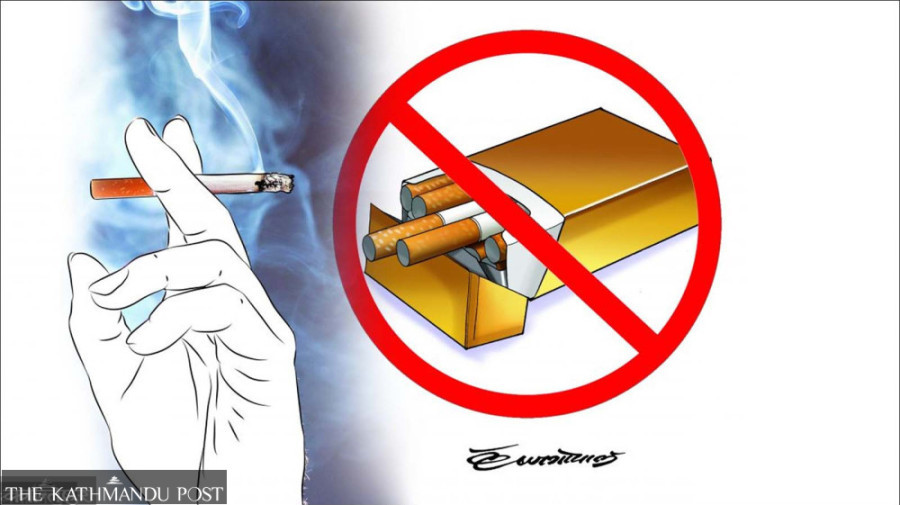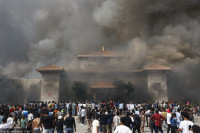Kathmandu
Kathmandu makes new push to enforce public smoking ban
Previous bans failed. Metropolitan officials say an awareness campaign is ongoing, action and fines will begin from August 17.
Post Report
In a bid to caution smokers about the decision to ban smoking in public places, the Kathmandu Metropolitan City (KMC) has started an awareness campaign within its jurisdiction.
Recent executive and municipal assembly meetings of the city office had decided to enforce a smoking ban in public places and slap a fine of Rs500 for violating the rule.
“We have already started an awareness campaign against smoking in public places,” said Raju Nath Pandey, chief of the KMC Police. “Our city police speak to people caught smoking in public places, ask them to stub out their cigarettes and collect the butts.”
The decision to ban smoking in public places is in accordance with Clause 42 of the Public Health Act, which the metropolis unveiled some two years ago.
“We will request and counsel the people smoking in public places for the next 20 days and start taking action from Bhadra 1 [August 17],” said Pandey. “If caught a second time smoking in public places, we will double the fine.”
When asked what the city police would do if the smoker did not have money to pay the fine, he said that the city office would bring such people to their office for counselling.
Tobacco use is a major risk factor for non-communicable diseases (NCD), including cancers, cardiovascular diseases, chronic lung diseases and diabetes. It is the world’s leading cause of preventable deaths and kills nearly eight million people every year. It claims 1.6 million lives in the WHO South-East Asia Region, which is among the largest producers and consumers of tobacco products.
The decision to ban smoking in public places is not unprecedented; it is the sixth announcement in the past eight years. The metropolis had decided to enforce a ban on smoking in public places several times in the past, including last year, in 2019, 2018 and 2016.
The City office had also imposed a ban on the sales of tobacco products in 2023. However, the Patan High Court later issued an interim order not to implement the decision to restrict sales of tobacco products.
Given the local unit’s failure to implement its announcements in the past, there is scepticism that the latest decision will not suffer the same fate.
“One can smoke within one's private house, but no one will allow to disturb others by smoking in public places,” said Deepak Kumar KC, chief of the health department of the metropolis. “Implementation of this decision helps improve public health and control pollution. Restaurants, hotels, and roadside tea shops can set up a separate smoking room to avoid the fines.”
Studies show 28 percent of men and five percent of women in Nepal smoke tobacco, according to the final report of the Nepal Demographic and Health Survey-2022, a nationwide study carried out by the Ministry of Health and Population between January 5 and June 22 last year.
The study shows 17 percent of men smoke on a daily basis, while 11 percent occasionally do. Among men who smoke cigarettes, a majority (54 percent) smoke less than five cigarettes per day on average. More men use smokeless tobacco than women—35 percent versus three percent. Overall, half of the men (50 percent) and only seven percent of women in Nepal use any type of tobacco.
There has been a decline in the proportion of women who smoke any type of tobacco since 2001—from 25 percent to 5 percent. Similarly, the proportion of women who smoke cigarettes declined from 23 percent in 2001 to four percent in 2022. Among men, the proportion who smoke any type of tobacco dropped from 45 percent in 2001 to 28 percent in 2022.
The proportion of women who smoke any type of tobacco increases with age, from one percent among those in the age group of 15–19 to 13 percent in the age of 45–49.
Women and men with more than secondary education (three percent and 25 percent, respectively) are less likely to use any type of tobacco compared to those with no education (16 percent and 73 percent, respectively).
The growing use of new and emerging products such as Electronic Nicotine Delivery Systems/E-cigarettes and the social use of sheesha/hookah are additional challenges to tobacco control, experts say.
“A lot of people, especially parents of teenage children, have complained to us and asked to prohibit the sales and use of tobacco,” said Dhurba Kumar Kafle, deputy spokesperson at the city office. “Our decision to impose a ban on smoking will discourage people from smoking.”
According to the World Health Organisation, tobacco kills 27,137 people in Nepal every year.




 11.12°C Kathmandu
11.12°C Kathmandu









